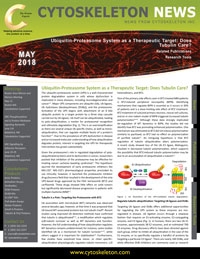May Newsletter: Ubiquitin-Proteasome System as a Therapeutic Target: Does Tubulin Care?
- By Cytoskeleton Inc. - Signal-Seeker News
- Apr 30, 2018

The ubiquitin-proteasome system (UPS) is a well-characterized protein degradation system in cells whose dysfunction is implicated in many diseases, including neurodegeneration and cancer. Major UPS components are ubiquitin (Ub), Ub ligases, Ub hydrolases (deubiquitinases [DUBs]), and the proteasome. Activation of the UPS begins with attachment of an 8 kDa ubiquitin protein to a target protein by a three step cascade carried out by Ub ligases. Ub itself can be ubiquitinated, leading to poly-ubiquitination, a marker for proteasomal recognition and ultimately degradation (Fig. 1). This is an oversimplification as there are several unique Ub specific chains, as well as mono-ubiquitination, that can regulate multiple facets of a protein’s function. Due to the prevalence of UPS dysfunction in disease and an increased molecular understanding of how ubiquitination degrades protein, interest in targeting the UPS for therapeutic intervention has grown substantially.
Given the proteasome’s role in regulated degradation of poly-ubiquitinated proteins and its dysfunction in cancer, researchers posited that inhibition of the proteasome may be effective for treating cancer cachexia (wasting syndrome). This hypothesis spurred the development of early proteasome inhibitors like MG-132. MG-132’s pharmacological properties precluded its use clinically; however, it launched the...
Also included in this newsletter:
- Signal Seeker™ Kits, Beads, and Antibodies, Spirochrome™ Live Cell Imaging Probes, Tubulin Kits and more
- Related Publications

